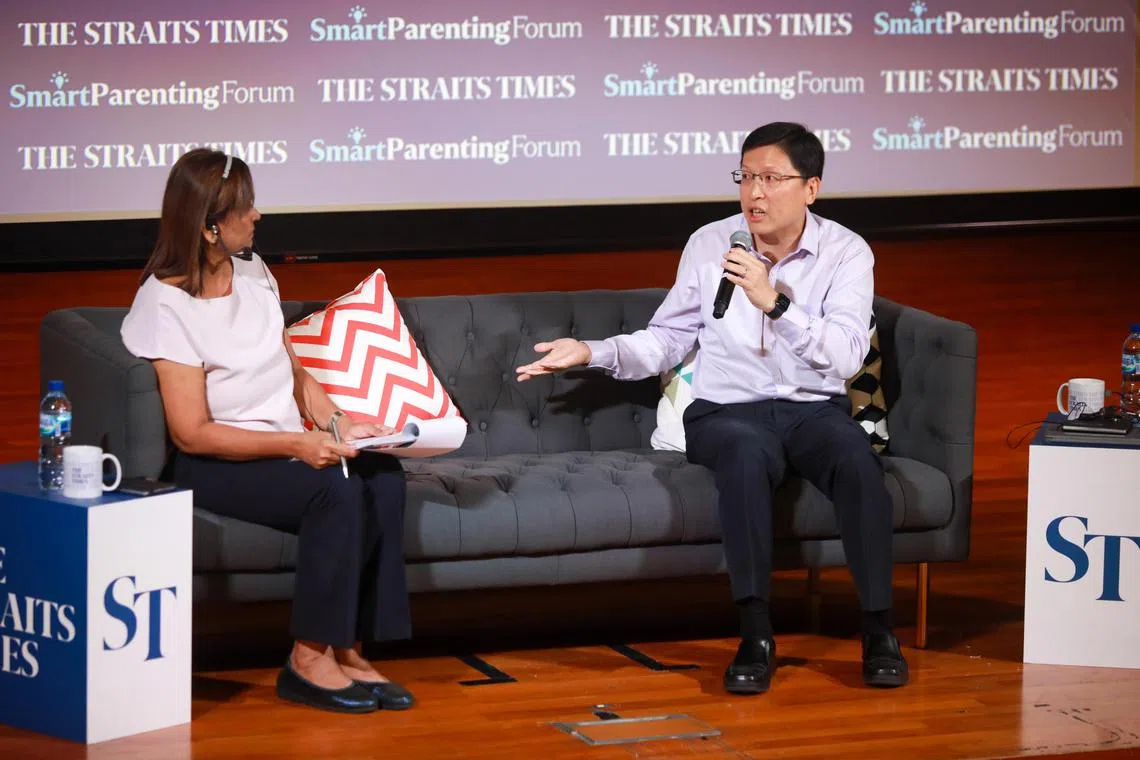Parents raise concerns on difficulty of PSLE maths exams at ST’s smart parenting forum
Sign up now: Get ST's newsletters delivered to your inbox
SINGAPORE – Primary School Leaving Examination mathematics exams have been a source of angst over the years, with parents complaining about their difficulty. On Saturday, this issue was again brought up by parents at a forum organised by The Straits Times.
One parent felt that questions that were once set for Primary 5 examinations are now being asked at a lower level.
Another audience member said children may not have the maturity to understand some real-life topics that are used in mathematics problems, like interest rates.
“We went through a simpler system – does that mean we are any worse than this generation? We are teaching kids too much, too fast,” the person added.
Responding to these comments, Ministry of Education (MOE) deputy director-general of education for curriculum Sng Chern Wei said the curriculum is reviewed regularly to ensure it is age-appropriate.
He added that schools are mindful not to teach concepts beyond what each age group can handle.
Said Mr Sng: “If we teach them today like how we were taught 20 years ago, we can’t say we are preparing them fairly for the future.”
He was speaking at The Straits Times Smart Parenting Forum on PSLE Preparation, which was held at Ngee Ann Polytechnic and attended by more than 230 people.
Mathematics was a hot topic, with several people asking why the examination questions seemed so hard to solve.
Mr Sng said the examination paper has to be designed with a range of difficulty levels, in order to gauge each pupil’s level of mastery.
“There are difficult questions that are meant to not be solved by everyone. You may see two or three items like that in a year.”
He pointed out that while an easy paper will give a child the impression that he or she has done well, it may not be helpful when it comes to making a recommendation as to which level of mathematics in secondary school the individual should take.

Ministry of Education deputy director-general of education for curriculum Sng Chern Wei in a discussion with Straits Times’ senior education correspondent Sandra Davie at The Straits Times Smart Parenting Forum on PSLE preparation at Ngee Ann Polytechnic on May 20.
ST PHOTO: RYAN CHIONG
The new scoring system for PSLE
The 2022 cohort of Primary 6 pupils was the second batch to sit the PSLE under the new system, where pupils are given an achievement level (AL) ranging from one to eight for each subject, instead of grades such as A* to E.
A PSLE score is now the sum of a pupil’s ALs, with the best score being four, and 32 the worst.
Parents raised concerns about the large range of marks for some of the lower achievement levels.
Mr Sng noted that while inserting a few more achievement levels would make the scores more finely differentiated, it would not be desirable.
“It does not make sense for such young students at PSLE to be subject to even more finely differentiated grading systems than the O- or A-level examinations,” he said.
In a discussion with ST senior education correspondent Sandra Davie, Mr Sng spoke about full subject-based banding (SBB), which will be implemented in 2024 across secondary schools.
The system has been piloted in some schools here since 2020.
Full SBB means that the current Express, Normal (Academic) and Normal (Technical) streaming system will no longer be used. Instead, students can take each subject at their preferred difficulty level.
Mr Sng said students have different strengths and interests across different disciplines, so having a more customised curriculum makes more sense in terms of catering to their needs.
“This will be the landscape that your child will experience when they go into a secondary school, and hopefully it is one that will allow them to really reach their full potential across the different subjects they are taking.”
Assuring worried parents in the audience, Mr Sng added that the love for one’s child should not be conditional on PSLE results, and this must be made clear to children.
“Help them believe that their self-worth and value is not contingent on examination grades,” he said. “They must have talent, dreams and aspirations that cut across different areas and go beyond just narrow academic development.”
He added: “We must not give the child an impression that if they don’t do well in PSLE, they are somehow less valued, less important or less lovable. Even if they do not do as well as you hope for, that is definitely not the end of the world.”



